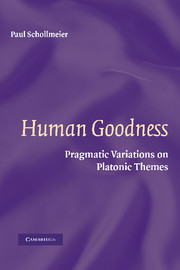7 - Human Virtue
Published online by Cambridge University Press: 28 July 2009
Summary
1. Can we become virtuous? Not very likely, I am afraid. How could mortal creatures, such as we be, entertain the merest hope even of attaining moral virtue (ἀρετή)? Those perseverant readers who are still with me may well have anticipated my answer. How could unrestrained, irrational ignoramuses possibly acquire a moral habit that might prove worthy of the mere name “virtue”?
But, then, can we ever become happy? Unfortunately, we cannot. If it is to be more than a fortuitous felicity, human happiness requires, among other things, moral virtue. True, we may fall into an activity that we can value for its own sake. Even children can discover an activity of this sort when, for example, they try out a new game. But to be happy for more than a moment, we must perform our activity in a manner not only more sophisticated but also more sustained. And to sustain a eudaimonic, or even a daimonic, activity, we must use our practical intellect to develop habits of a practical sort.
Nonetheless, human beings, unhappy though we be, can acquire habits that more or less approximate moral virtue. What might these approximations be? Moral virtue for us can be only a habit that we attempt to instill in ourselves in accordance with what we take to be a practical truth. But because we can only hypothesize about any truth, practical or not, our virtue, if we may so denominate it, can be at best a facsimile of true virtue.
- Type
- Chapter
- Information
- Human GoodnessPragmatic Variations on Platonic Themes, pp. 238 - 273Publisher: Cambridge University PressPrint publication year: 2006



